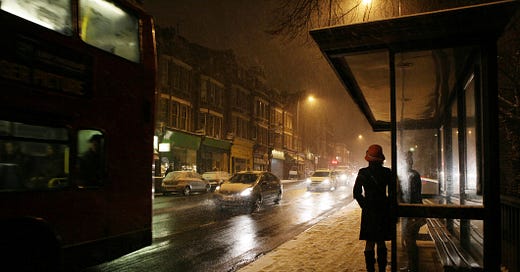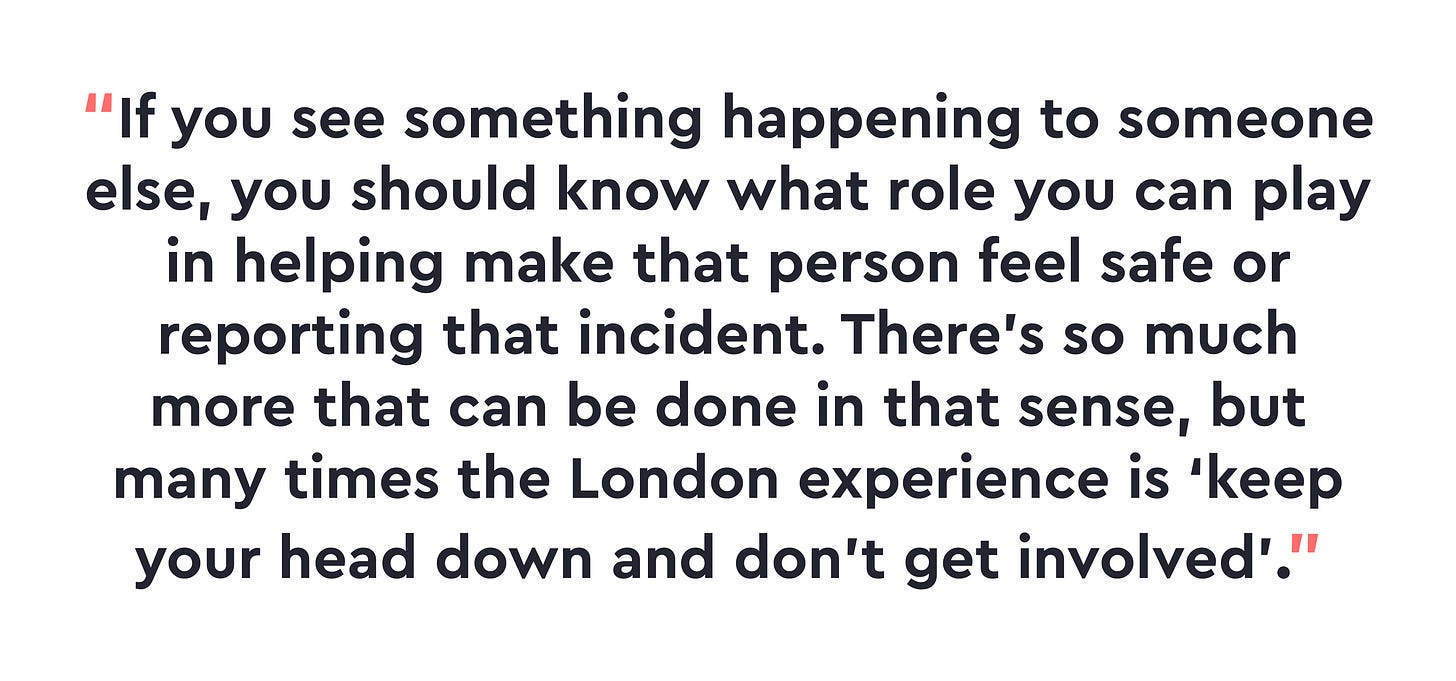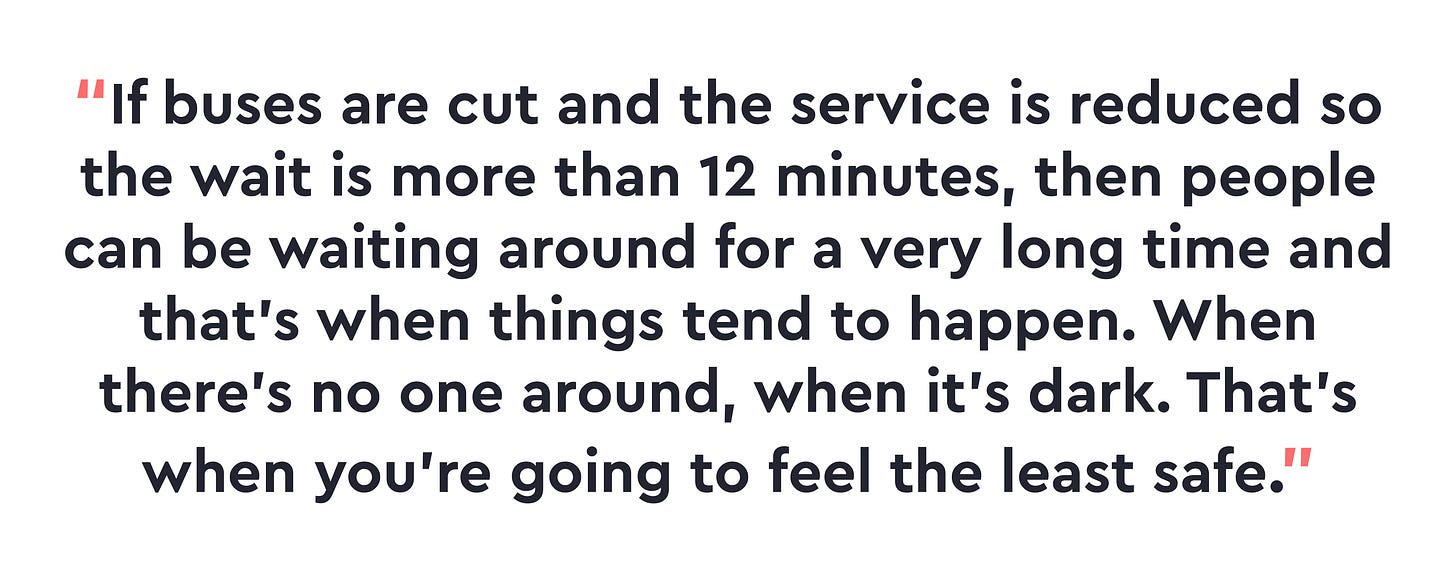Welcome to the free Monday edition of London in Bits. LiB is an independent publication that is only made possible through paid subscriptions. Paid subscribers can also access the entire back catalogue of paywalled articles, including our look at ‘flying taxis’ or our issue on mental health in the hospitality industry.
If you’re not a paying subscriber already you can sign up here:
If you would prefer to make a one-off payment directly, or if you don’t have funds right now but still wish to subscribe, send us an email and we’ll sort something out.
In the past couple of years the issue of safety on public transport has really focused on not catching Covid. But there is a broader and more longstanding issue that goes beyond mask wearing, one that was brought into sharp relief by the murder of Sarah Everard and has been further complicated by the current Night Tube strike, which has robbed many Londoners of a safe and easy way of getting home from a night out (and that’s before we get to the bus and Tube cuts that could come about as a result of TfL’s current funding nightmare).
Last week the transport watchdog, London TravelWatch, published the results of seven months of research they’ve done into the “personal security for people travelling in London”. Some of the results were pretty eye-opening.
38% of disabled transport users have experienced a hate crime or harassment over the last three years
Nearly one in four women had experienced unwanted sexual behaviour in the last three years
Over 70% of people who felt unsafe have stopped travelling at certain times of the day.
To dig a bit more into the findings we got hold of Saphia Haffejee, London TravelWatch’s Advocacy and Policy Officer and the author of the report, to ask her what had prompted her to commission this research in the first place, what it can tell us about how safe people are when they’re travelling around London, and what could be done to make it safer.
First off, can you just explain what London TravelWatch is and what you do?
We’re the statutory watchdog for transport users in London. Which basically means we represent anyone who travels in London, whether that’s by train, bus, bike, car, taxi or pedestrians.
Our job covers two things really. The first is to take on complaints. If you complain to a transport provider like TfL or a rail company and you’re not happy with the response you get, then it would probably come to us. The other side of our work, which is the work I do, is the policy and advocacy side of things. That’s pressing anyone who has an influence over the transport industry, whether it’s the providers, the government or TfL, to improve the services available and make a better passenger experience.
Can you talk a bit about your motivation for producing this report in particular?
When the headlines hit last year about Sarah Everard, that was a really big moment for a lot of different kinds of organisations. A moment for them to reflect on what their role was in that conversation and the wider narrative around the issue of women’s safety.
As a young woman myself, I was thinking about it a lot. I was thinking about what exactly we were doing, our role in representing people who travel and how we could be doing a better job. Do we really know how safe people are? What needs to change to make people safer? So I suggested we run this piece of work.
We worked with a research agency to talk to transport users as well as doing a public survey and some collaboration work with the Young Women’s Trust, who we ran a focus group with. And what we found is that there's so much that transport users would like to see, but also that there are certain transport users who are more likely to feel at risk, including women, but lots of different groups as well (by the way, we say ‘transport users’ because it encompasses everyone, but it is a bit of a jargon word).
Did you have any specific aims or hopes for the research before you set out?
The original questions we were asking were an attempt to reflect what’s going on in society and the questions people are asking around safety. But also we recognise that transport is just one part of society where these sort of issues play out, so people don't necessarily tend to think about transport when looking at, for example, the job the police are doing. So what we were hoping to get out of this was to look at these issues through the very specific lens of transport and find some tangible actions that maybe aren’t happening already but which could probably happen.
What are the key outcomes of the report? The things people you think people should take away from the work you’ve done.
Two things really. One is the specific, practical recommendations like making sure every tube line has CCTV and having an app available that people can report incidents on. These are really practical things that we know the transport industry and policing authorities can do. So we wanted to name them and get them written down so that we can start measuring whether they’re actually doing them or not.
The other, less tangible thing is culture change. A culture change for the transport providers and the policing authorities in the way they are approaching safety and their duty to keep people safe, but also the culture change and behaviour change that we need to see from the wider public.
For example, bystander behaviour and being aware of what's going on around you. If you see something happening to someone else, you should know what role you can play in helping make that person feel safe or reporting that incident. There’s so much more that can be done in that sense, but many times the London experience is ‘keep your head down and don't get involved’. What our report really picked up on is that, particularly for people who feel unsafe or have witnessed or experienced things that are unsafe, that they would like to see more of that kind of that support from others.
What’s your advice to people who are kind of in that situation where they want to do something useful and helpful but feel like they maybe can’t?
What people told us is that, when they see something wrong then they want to take some sort of action, but there’s no playbook. There’s no guidelines for what they should be doing. Should they intervene? Is it always safe to do that? We use the example of when there’s someone who needs to sit down and passengers offer to give up their seat. That's pretty normalised, but we don’t have the same set of normalised behaviours for bystanders who see something that’s not right happening to someone else.
There’s a couple of things that other campaigns and more grassroots organisations have suggested and we’ve picked up on some of those. There's also things that TfL and the rail industry have been putting out. But we don't think there’s enough there in terms of guidance or about when it’s safe to do those things. So one of our key recommendations is for the transport industry to actually get together and agree what is the right thing to do and then actually start communicating it to people. Because there’s a complete lack of information out there and people would like to be able to say ‘This is what they told me is the right thing to do, so I feel confident doing it’.
One of those really key actions is reporting. The insights that the British Transport Police and the Met get from other people, not just the victims, are crucial in building up information about repeat offenders and hotspots in the network. That information needs to be reported, but so many people don't know how valuable their information is because it’s not communicated well enough at all.
Was there anything that came out of your research that really hit home for you? That maybe shocked you a bit?
For me, it was just how many people have actually changed their travel habits or decided not to travel at certain times of the day because they’ve experienced something unsafe or they just don’t feel safe. That showed me that it really is an underlying issue for a lot of different people and, if they felt safer, then our transport network would be far more accessible to so many more people.
In particular, disabled people are most likely to have experienced hate crime but also any sort of harassment or verbal abuse. It’s such a prevalent problem but it doesn't get enough attention. Again, it’s another example of where better guidance around bystander intervention would have a big impact.
How optimistic are you that something that can be done to solve some of these problems? TfL is struggling so much right now, both with its funding and with ongoing strikes, do you think your report can play a part in highlighting the importance of a well-funded and secure travel network?
A big part of our message has been about the importance of funding transport services as part of the safety solution, as well as supporting the nighttime economy. The night bus services and the Night Tube are really important services, but also the frequency of services is crucial. If buses are cut and the service is reduced so the wait is more than 12 minutes, then people can be waiting around for a very long time and that's when things tend to happen. When there’s no one around, when it’s dark. That's when you're going to feel the least safe.
So there's a really important safety element to this. The government and the Mayor and TfL all have a safety agenda at the moment, so our hope is that this report lands well with them, because it’s another really good reason to keep public transport well funded.
What about those cultural shifts you were talking about? How do you see those coming about?
In terms of addressing those bigger picture issues, part of our recommendations are around education and campaigns which raise awareness. We’ve seen some really good campaigns in the last year from TfL with the ‘Hands Up’ campaign raising awareness of hate crime , but also the sexual harassment on the railways campaign and the various actions that have come out of that.
We’re also engaging with other organisations working to tackle these issues on a societal level. For example Our Streets Now and Plan UK are running the campaign to make public sexual harassment a crime, and that’s something that will transform the way that those sorts of crimes are policed and will categorise things like ‘catcalling’, which is actually verbal harassment, a crime. That is something that’s important to transport because ‘transport’ includes the experience of walking down the street or cycling. So many cyclists, particularly women cyclists, experience sexual harassment. So all of these kinds of things can really play out across quite wide spectrum of areas.
Now the report is out there, what are the next steps for you?
We see this work as statement of intent in a way and we are intending to make this part of our regular work.
We are not dropping this off the agenda. We want to see this change happening. We've got these recommendations now and we've been working very closely with the transport industry and the policing authorities in London to test these recommendations with them to make sure that there is scope to make progress. So we think they are achievable.
And while some of them are a bit more long-term than others, there are things like having a reporting function in an app that should really be happening very soon. So there’s definitely things in there that we think can be achieved and will make a real difference. But it's about keeping that pressure up and working with other organisations and voices who are pushing on these areas in a broader sense to galvanise that support and pressure.
You can read the full report here (it’s less than 20 pages).
News bits
Former Met officer, Stephen Kyere, has been charged with rape, attempted rape and indecent assault over an alleged attack in Teddington, that occurred in 2004.
A new YouGov poll has found that, for the first time since he became mayor, more Londoners think Sadiq Khan is doing badly (48%) rather than well (38%) in the job.
The Week looks at how London became the city of choice for Russian ‘dirty money’ and why it might be too late to impose sanctions on Russia now, given how tangled we are in their ‘web of influence’ (no matter how much Liz Truss says different).
Talking of dirty money… The Vatican has finally offloaded that “luxury building” on Sloan Avenue that’s been causing them problems ever since they agreed to pay “exorbitant fees” to ‘shady’ Italians middlemen to buy it (for way more than it was worth).
Someone at the Daily Mail spotted a tweet about a “massive hoard of bikes outside a South London house” and wrote a very lazy and ignorant article based on it. “Are you the owner of this house?” they ask, when anyone with a modicum of knowledge about Brixton knows it’s the home of the legend that is Sam the Wheels.
A Malaysian businessman has filed a counter-suit against Aspinalls casino, which he says did not “fulfil its legal duty to stop him from losing more” in a 72 hour gambling session back in 2015, during which he lost £3.9 million.
Apparently Matt Hancock has caused a fuss (Telegraph paywall alert) by going for a swim in the Serpentine despite not being a member of the Swimming Club, and is now considering starting a ‘free the Serpentine’ campaign
Barbecue restaurant Hotbox (which has market stalls in Fulham and Victoria) have had to close their only physical restaurant. The Spitalfields spot shut down this weekend after their investors pulled out.






